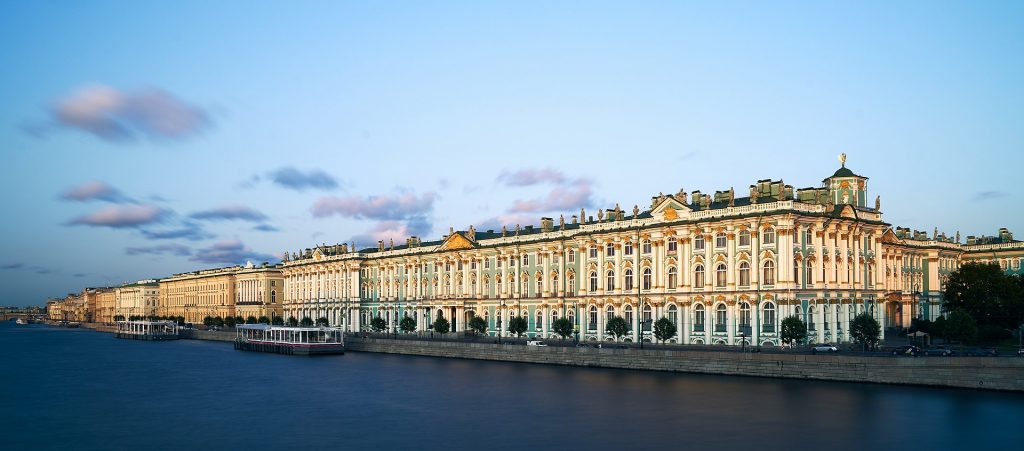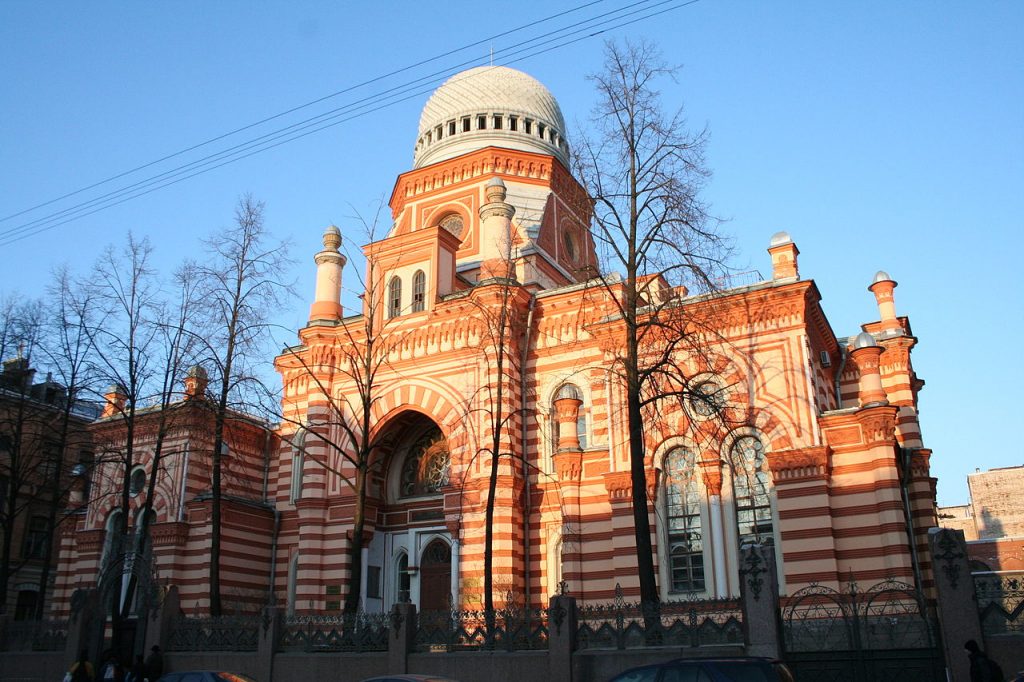
Despite the prohibition against Jews living in Russia, beyond a clearly defined zone, there were a few remarkable exceptions in the eighteenth century, particularly in the capital, Saint Petersburg, where the Russian-Jewish intelligentsia was concentrated.
In 1900, Jews in Saint Petersburg already numbered 20,385, or 1.4% of the population. This figure would climb to 50,000 by 1917 (2%), 95,000 by 1929 (5.3%), and 201,500 in 1939 (6.3%). Official sources estimate Saint Petersburg’s Jewish community today at somewhere between 80,000 and 100,000 members.

Jews in Saint Petersburg (Leningrad during the Soviet era) came from a higher social class than those living in the shtetlach in Ukraine or Belarus, for it was the community’s more affluent segments that managed to leave the ghettos for the big city. There were often tradespeople, but also white-collar workers, civil servants, members of the liberal professions (doctors and lawyers), and artists, the majority of whom were assimilated. Although, in 1869, 98% of Jews in Saint Petersburg claimed Yiddish as their native language, that number had fallen to 55% by 1910, 30% by 1926, 20% by 1939, and to microscopic levels today.
This progressive loss of interest in the mother tongue, fairly logical for those living in a world-class capital where everyone vied for social advancement, also contributed to the poor success of Jewish Theater Studio: founded by Granovsky in 1919 on Vasilievsky Island, the studio was forced to relocate in Moscow in 1920, where the public was more working class.
Properly speaking, there was no Jewish quarter in Saint Petersburg, as Jews were spread out across the city. However, they were more concentrated in and more partial to some areas than others.
The great Petersburgers
Numerous Jewish luminaries in Saint Petersburg made their mark on the social and political life of Russia. To name a few:
Piotr Shafirov (1669-1739): Son of a merchant from Smolensk, preeminent statesman, diplomat, and businessman, he was an adviser to Peter I. An ennobled master of Russian foreign policy, he was also an ancestor of the poet Viazemsky and the writer Aleksey Tolstoy.
Simon Dubnov (1860-1941): The great historian of the Jewish world, author of numerous books, including his ten-volume History of the Jews, he died in the Riga ghetto.
Abram Peretz (1771-1833): Son of a rabbi from Lubartów, he came to Saint Petersburg under Potemkin’s protection and became a government economic adviser.
David Feinberg (1840-1916): Hailing from Germany, he moved to Saint Petersburg in the late 1860s. He became the patron of the Choral Synagogue.
Jacob Halperin (1840-1914): A civil servant in the Ministry of Justice.
Samuel Palakors (1837-88): Financier, founder of banks, and builder of railroads, he contributed 16% of the construction of the Choral Synagogue of Saint Petersburg.
Anton Rubinstein (1829-94): Born in Polodia (Ukraine), this famous pianist, composer, and conductor founded the Russian Musical Society in 1859 and the Saint Petersburg Conservatory in 1862, which bore his name.
Maxim Vinaver (1863-1926): Jurist and politician, Kadet Party member and deputy, he was elected member of the Constituent Assembly in 1917 and later became a minister.
Dekabristov (Decembrist) Street
On what was formerly Offizierskaya Street near the synagogue and Teatralnaya Square, the building of the Eisenbeth Jewish secondary school still stands at number 18, behind the Marinsky Theater (it serves today as the Marinsky box office).
Toward the end of the Decembrist Street, at number 57 you can find the house where Alexander Blok lived from 1912 to 1921 and died.
The neighborhood continues around the Griboiedov canal, where at number 140 a society dedicated to helping the city’s impoverished Jews provided a soup kitchen and mikvah.
Vasilievsky Island
This very popular neighborhood, with its market on Bougskaya Street, looks of Podolia, Chortkow, or Zhmerinka. On the adjacent streets called Tenth Line and Fifth Line, there was a Jewish School (Fourteenth National Jewish School at 37 Tenth Line Street) and the Etnographic Historical Society Museum (at 50 Fifth Line Street). Simon Dubnov once worked at this museum, which was opened in 1916 by An-Ski, a pseudonym of Shlomo Zanvil Rapoport, but it closed in 1929 along with the majority of other Jewish institutions in Saint Petersburg.
The Choral Synagogue
The Choral Synagogue is the nerve center of Jewish life in Saint Petersburg. This imposing, high-domed building was constructed in 1899 with financial support from many patrons. The main room has been restored and was reopened in 2001. In contrast to Moscow, this is the city’s only synagogue; it thus serves the entire Jewish community. The chief rabbi, Menahem Mendl Pevsner, stresses that although he is a follower of Chabad, the community itself is not explicitly Chabad. The site today houses all Jewish community institutions, including a yeshiva, a kosher kitchen, a shop, and a library.
The memory of Saint Petersburg’s Jewish community and, more generally, that of all Russian Jews is preserved in the Jewish Community Center’s well-stocked library. It contains a unique collection of Jewish samizdat publications of the Soviet era and Jewish periodicals dating back to the days of Perestroika.
The Preobrazhensky Jewish cemetery
Unlike Moscow, Saint Petersburg has a Jewish cemetery , Preobrazhensky, located far from downtown near the southeast edge of the city. It is truly immense. A prayerhouse built in 1908-12 and designed by the architect Gewirtz stands at the cemetery’s entrance and includes a sort of columned atrium. Of course, the cemetery attests to the vibrancy of Saint Petersburg’s Jewish community.